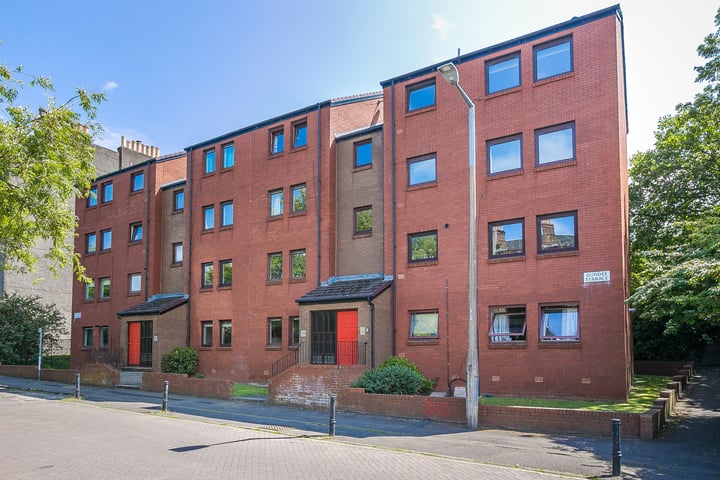The property market can be overwhelming, filled with jargon and complicated processes guaranteed to befuddle first-time buyers and seasoned veterans alike. Our detailed Property Buying Guide aims to demystify the industry to give you the tools to confidently source and purchase your next dream home (and perhaps even save some money, too).
Here, we’ll discuss the channels available to search for homes on the market and explain some key terms for understanding how much you’ll pay for homes you’re interested in.
Where Can I Find Properties for Sale?
Thanks to the web, the days of staring into estate agents’ windows to get a peek at the properties for sale are long gone. Nowadays, you’ll find a huge range of property search sites and channels that allow you to browse potential new homes from the comfort of your living room.
Solicitors’ Property Centres
As solicitor estate agents traditionally sell properties, there are a number of Solicitors’ Property Centres (SPCs) in Scotland, which aim to gather information about homes for sale together in one place – making it easier than ever to browse and compare the latest ones on the market. Many SPCs have their own websites, while some also have their own paper-based marketing channels and shop premises you can visit to see what’s on offer.
The biggest and most well-known SPCs in Scotland are ESPC in Edinburgh and ASPC in Aberdeen. Nearly all estate agents in these areas are also solicitor films, meaning you’ll find most homes for sale on the ESPC or ASPC websites or in their weekly newsletter.
Bear in mind, however, that only solicitor estate agents can advertise homes via SPCs, so to find non-solicitor estate agents’ properties, you’ll need to look elsewhere.
Property Portals
Property portals are property advertising websites where estate agents and solicitor estate agents can promote their clients’ homes for sale and rent. Property portals include nationwide websites like Rightmove and Zoopla, and Solicitors’ Property Centre sites like ESPC and ASPC. Here, you can arrange viewings, browse photos of the properties you’re interested in and get helpful information about the local area and amenities.
Any estate agent can advertise their properties on property portals, whether they are solicitors or not. However, it’s worth noting that many solicitor estate agents don’t advertise on property portals like Rightmove and Zoopla, preferring to choose SPCs instead. Still, you’ll find nearly all non-solicitor estate agents’ properties on these sites – meaning it’s worth broadening your search to include both national and local property portals when searching for your next dream home.
Get to Know Your Local Estate Agent
Some properties are sold before they even appear online, so it’s worthwhile getting to know your local estate agent to find out about suitable homes that come their way. Let them know your budget and what type of property you’re after, and they should be able to give you an idea of how reasonable your goals are, how much those properties are selling for, and even the median time such homes spend on the market.
Moreover, many estate agents allow you to sign up for email alerts on their websites, sending you just-published properties straight to your inbox. Why not sign up for our property email alerts to learn about new homes on the market that match what you’re looking for?
For Sale Boards
It’s always worth keeping an eye out for For Sale boards in any areas you’re interested in buying. By simply walking around the neighbourhoods, you can easily find new homes on the market with the contact information of the estate agent handling the sale. Bear in mind, however, that some people don’t want For Sale boards on their properties, so you’re unlikely to find everything available that way.
Newspapers
With the rise of cost-effective web-based platforms, like SPCs and property portals, advertisements for new homes in the newspaper have dropped significantly. That being said, picking up a copy of the local paper and flicking through the property section is always worthwhile – you never know what you might find.
Moreover, these ads are open to both estate agents and solicitor estate agents, making them an excellent channel for an overview of what’s available on the market.
How Do I Know if the Asking Price Is Reasonable?
If you’ve found a property you’re interested in buying, you may be wondering whether the price advertised is reasonable. First, it’s important to note that the price listed is often what the seller wants rather than how much the property is worth. So, how do you know if it’s a good deal?
Most property portals have sections where you can browse similar properties in the area to discover what they sold for. However, they’re unlikely to provide you with much information beyond this. Solicitor estate agent firms, on the other hand, have access to several resources that give them vast amounts of detail about the specifics of a property, allowing them to advise you on whether the home is ‘worth it’ and assist you in attaining the best price – just another reason why getting to know your local estate agent, like the team at MOV8, can help you find the perfect property.
You’ll also be able to use the property’s Home Report to determine whether the asking price is reasonable. Introduced in 2008 by the Scottish Government, a Home Report is a legally required document consisting of three sections (the single survey, property questionnaire and energy report), which aim to provide potential sellers with information on the property’s condition. Any seller who puts their home on the market must obtain a Home Report for interested parties and their agents to access for the duration of the sale.
The single survey section of the Home Report contains a professional evaluation, carried out by a chartered surveyor, of the property’s value. In this document, you can learn more about the property’s state, its accessibility, and what repairs, if any, need doing now or in the near future. It’s an essential step in deciding both whether a home is for you and whether the asking price is worth it. And for more information on what to watch out for, why not read our ‘5 Things to Look Out for in the Home Report’ blog?
If you’re interested in reading a property’s Home Report, you can request it from the seller, their solicitor or the agent dealing with the sale. Note that there is no obligation to buy at this point, so you can easily request the documents and walk away without penalty if the home isn’t for you.
What Do ‘Fixed Price’, ‘Offers Around’ & ‘Offers Over’ Mean?
Property market jargon can be confusing – let’s simplify things.
The terms ‘Fixed Price’, ‘Offers Around’ and ‘Offers Over’ are marketing tactics and will vary depending on the seller’s intentions. Regardless, it’s important to remember that the seller isn’t obligated to sell to you. So, even if you bid the full asking price (or more), there is no guarantee that you will be successful.
Fixed Price – properties marketed at ‘Fixed Price’ mean the seller is letting prospective buyers know what they want to achieve and will be content to accept this figure. Usually, this means a buyer can feel confident about how much they would pay for the property.
Offers Around / Offers in the Region Of – this suggests the seller is open to negotiating the price, either a little below or above. Typically, the price will be set slightly below the property’s market value to encourage interested buyers to start a bidding war and thus grant the seller the most profit.
Offers Over – this term can be a little harder to determine as the seller could be looking for anything from 5% to 25% above the asking price. This usually suggests the seller hopes to have multiple interested parties in order to set a ‘closing date’ where the potential buyers bid against each other. ‘Offers Over’ only tends to work in a very competitive market or for the most desirable properties and areas.
So, You’ve Found Your Dream Home. What’s Next?
If you’ve found the perfect property for you and you’re ready to take action to make it yours, then it’s time to hire a solicitor and begin the process formally. Read the next page in our Detailed Property Buying Guide to discover everything you need to know about solicitors, including how to find one, their role in the process, and what they’re likely to quote for.







Leave a Reply